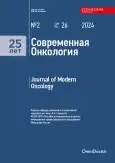Second line chemotherapy for advanced biliary cancer: FOLFOX versus FOLFIRI: Analysis of retrospective and prospective data
- Authors: Savchenko I.V.1, Stilidi I.S.1,2, Dzhanyan I.A.1, Antonova E.Y.1, Polyakov A.N.1, Egorova A.V.2, Chulkova S.V.1,2, Breder V.V.1
-
Affiliations:
- Blokhin National Medical Research Center of Oncology
- Pirogov Russian National Research Medical University
- Issue: Vol 26, No 2 (2024)
- Pages: 202-209
- Section: Articles
- URL: https://journals.rcsi.science/1815-1434/article/view/260603
- DOI: https://doi.org/10.26442/18151434.2024.2.202753
- ID: 260603
Cite item
Full Text
Abstract
Aim. To evaluate the efficacy and toxicity of second-line polychemotherapy according to FOLFOX or FOLFIRI regimen in patients with biliary tract tumours after progression during first-line chemotherapy (CT).
Materials and methods. The study is based on the analysis of retrospective and prospective data on the examination and treatment of 94 patients with biliary cancer of grades T1-4N0-2M0-1 followed-up and treated at the N.N. Blokhin National Medical Research Center of Oncology from 2015 to 2023. All patients were divided into 2 groups: Group 1 (FOLFOX, n=47) and Group 2 (FOLFIRI, n=47). In Group 1, patients received the recommended FOLFOX second-line CT regimen. Patients in Group 2 received FOLFIRI regimen. The endpoints were overall survival (OS) and incidence of grade 3-4 adverse events.
Results. The study included 94 patients. In the FOLFOX group, the median OS was 13.0 months (1-year OS was 57.8±7.4%); for the FOLFIRI group, the median OS was 12.3 months (1-year OS was 54.4±7.3%). The toxicity profiles of FOLFOX and FOLFIRI were acceptable and consistent with those reported for the regimens. According to the grade 3–4 toxicity data, diarrhea was significantly more common in the FOLFIRI group (p=0.014), and neurotoxicity was more common in the FOLFOX group (p=0.006). During the second-line CT, the frequency of grade 1–4 toxicities in the groups did not differ: 18 (38.3%) events in the FOLFOX group and 19 (40.0%) events in the FOLFIRI group.
Conclusion. Our results of evaluating the efficacy and toxicity of the second-line polychemotherapy regimens show that the FOLFOX and FOLFIRI CT regimens have equal efficacy in patients with advanced biliary tract cancer with a good performance according to the ECOG scale, who previously received the first-line therapy with a combination of gemcitabine with a platinum agent (cisplatin or oxaliplatin); also, our data demonstrate similar toxicity profiles of these regimens.
Full Text
##article.viewOnOriginalSite##About the authors
Ilya V. Savchenko
Blokhin National Medical Research Center of Oncology
Author for correspondence.
Email: Sv2505.is2006@gmail.com
ORCID iD: 0000-0003-2142-661X
oncologist
Russian Federation, MoscowIvan S. Stilidi
Blokhin National Medical Research Center of Oncology; Pirogov Russian National Research Medical University
Email: director@ronc.ru
ORCID iD: 0000-0002-0493-1166
D. Sci. (Med.), Prof., Acad. RAS
Russian Federation, Moscow; MoscowIrina A. Dzhanyan
Blokhin National Medical Research Center of Oncology
Email: i-dzhanyan@mail.ru
ORCID iD: 0000-0002-6323-511X
oncologist
Russian Federation, MoscowElena Yu. Antonova
Blokhin National Medical Research Center of Oncology
Email: elenaantonova5@mail.ru
ORCID iD: 0000-0002-9740-3839
Cand. Sci. (Med.)
Russian Federation, MoscowAlexander N. Polyakov
Blokhin National Medical Research Center of Oncology
Email: Dr.alexp@gmail.com
ORCID iD: 0000-0001-5348-5011
Cand. Sci. (Med.)
Russian Federation, MoscowAngelina V. Egorova
Pirogov Russian National Research Medical University
Email: sapphirr5@mail.ru
ORCID iD: 0000-0003-3904-8530
Cand. Sci. (Med.)
Russian Federation, MoscowSvetlana V. Chulkova
Blokhin National Medical Research Center of Oncology; Pirogov Russian National Research Medical University
Email: chulkova@mail.ru
ORCID iD: 0000-0003-4412-5019
Cand. Sci. (Med.)
Russian Federation, Moscow; MoscowValeriy V. Breder
Blokhin National Medical Research Center of Oncology
Email: vbreder@yandex.ru
ORCID iD: 0000-0002-6244-4294
D. Sci. (Med.)
Russian Federation, MoscowReferences
- ASCO: Bile Duct Cancer (Cholangiocarcinoma): Statistics. Approved by the Cancer.Net Editorial Board, 08/2023. Available at: https://www.cancer.net/cancer-types/bile-duct-cancer-cholangiocarcinoma/statistics. Accessed: 15.12.2023.
- Бредер В.В., Базин И.С., Балахнин П.В., и др. Практические рекомендации по лекарственному лечению больных злокачественными опухолями печени и желчевыводящей системы. Практические рекомендации RUSSCO, часть 1. Злокачественные опухоли. 2023;13(3s2-1):494-538 [Breder VV, Bazin IS, Balakhnin PV, et al. Prakticheskie rekomendatsii po lekarstvennomu lecheniu bol’nykh zlokachestvennymi opukholiami pecheni i zhelchevyvodiashchei sistemy. Prakticheskie rekomendatsii RUSSCO, chast’ 1. Zlokachestvennye opukholi. 2023;13(3s2-1):494-538 (in Russian)]. doi: 10.18027/2224-5057-2023-13-3s2-1-494-538
- Kendre G, Murugesan K, Brummer T, et al. Charting co-mutation patterns associated with actionable drivers in intrahepatic cholangiocarcinoma. J Hepatol. 2023;78(3):614-26. doi: 10.1016/j.jhep.2022.11.030
- Frega G, Cossio FP, Banales JM, et al. Lacking Immunotherapy Biomarkers for Biliary Tract Cancer: A Comprehensive Systematic Literature Review and MetaAnalysis. Cells. 2023;12(16):2098. doi: 10.3390/cells12162098
- Jansen H, Pape UF, Utku N, et al. A review of systemic therapy in biliary tract carcinoma. J Gastrointest Oncol. 2020;11(4):770-89. doi: 10.21037/jgo-20-203
- Möhring C, Feder J, Mohr RU, et al. First Line and Second Line Chemotherapy in Advanced Cholangiocarcinoma and Impact of Dose Reduction of Chemotherapy: A Retrospective Analysis. Front Oncol. 2021;11:717397. doi: 10.3389/fonc.2021.717397
- Rizzo A, Brandi G. First-line Chemotherapy in Advanced Biliary Tract Cancer Ten Years After the ABC-02 Trial: “And Yet It Moves!” Cancer Treat Res Commun. 2021;27:100335. doi: 10.1016/j.ctarc.2021.100335
- Lamarca A. ABC-06. A randomised phase III, multi-centre, open-label study of active symptom control (ASC) alone or ASC with oxaliplatin/5-FU chemotherapy (ASC+mFOLFOX) for patients (pts) with locally advanced/metastatic biliary tract cancers (ABC) previously-tr. J Clin Oncol. 2019;37:4003. doi: 10.1200/JCO.2019.37.15_suppl.4003
- Sebbagh S, Roux J, Dreyer C, et al. Efficacy of a sequential treatment strategy with GEMOX-based followed by FOLFIRI-based chemotherapy in advanced biliary tract cancers. Acta Oncol. 2016;55(9-10):1168-74. doi: 10.1080/0284186X.2016.1191670
- Hyung J, Kim I, Kim KP, et al. Treatment with liposomal irinotecan plus fluorouracil and leucovorin for patients with previously treated metastatic biliary tract cancer: The phase 2b NIFTY randomized clinical trial. JAMA Oncol. 2023:e230016. doi: 10.1001/jamaoncol.2023.0016
- Lamarca A, Kapacee Z, Breeze M, et al. Molecular profiling in daily clinical practice: practicalities in advanced cholangiocarcinoma and other biliary tract cancers. Jl Clin Med. 2020;9(9):2854. doi: 10.3390/jcm9092854
- Manne A, Woods E, Tsung A, et al. Biliary Tract Cancers: Treatment Updates and Future Directions in the Era of Precision Medicine and Immuno-Oncology. Front Oncol. 2021;11:768009. doi: 10.3389/fonc.2021.768009
Supplementary files









